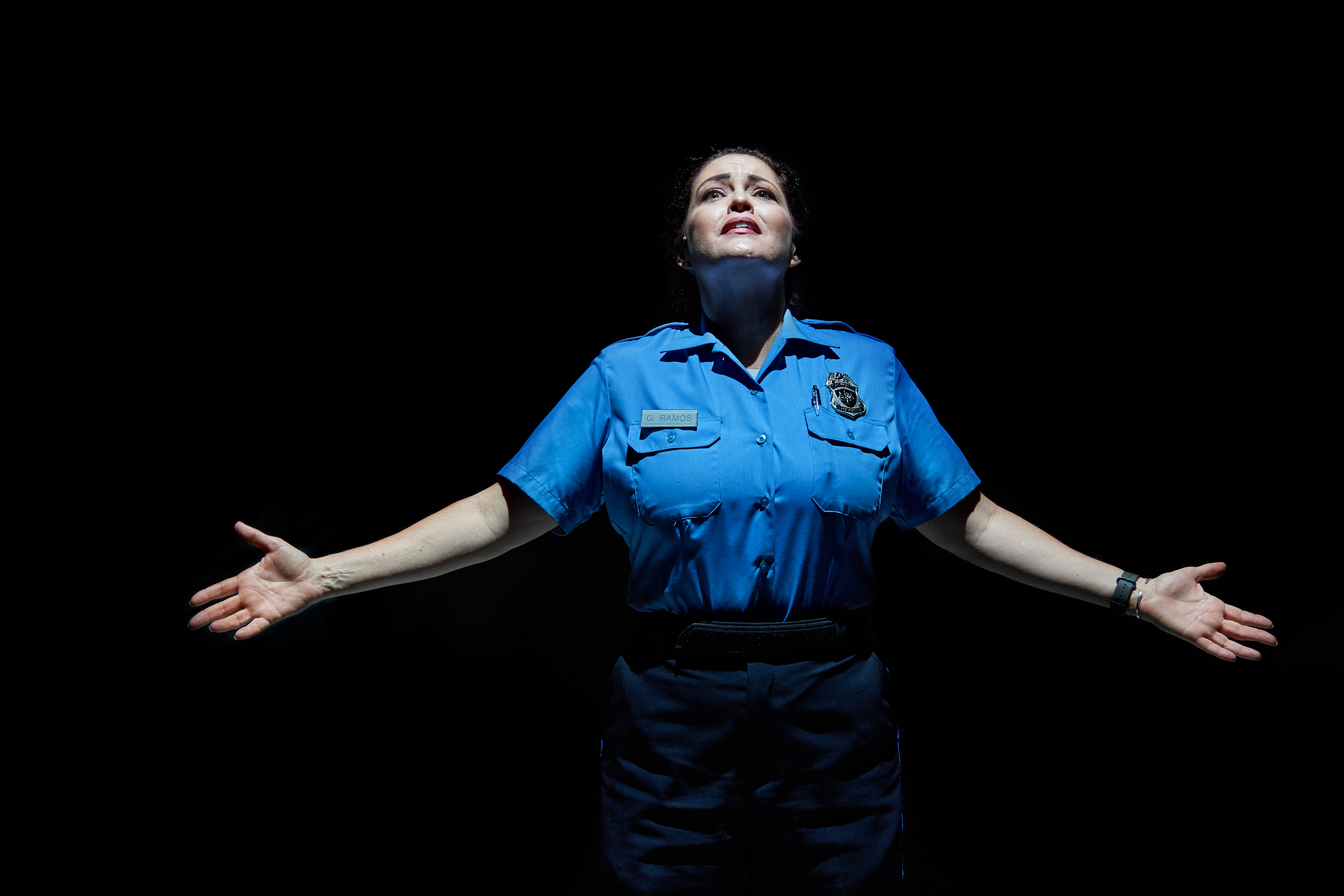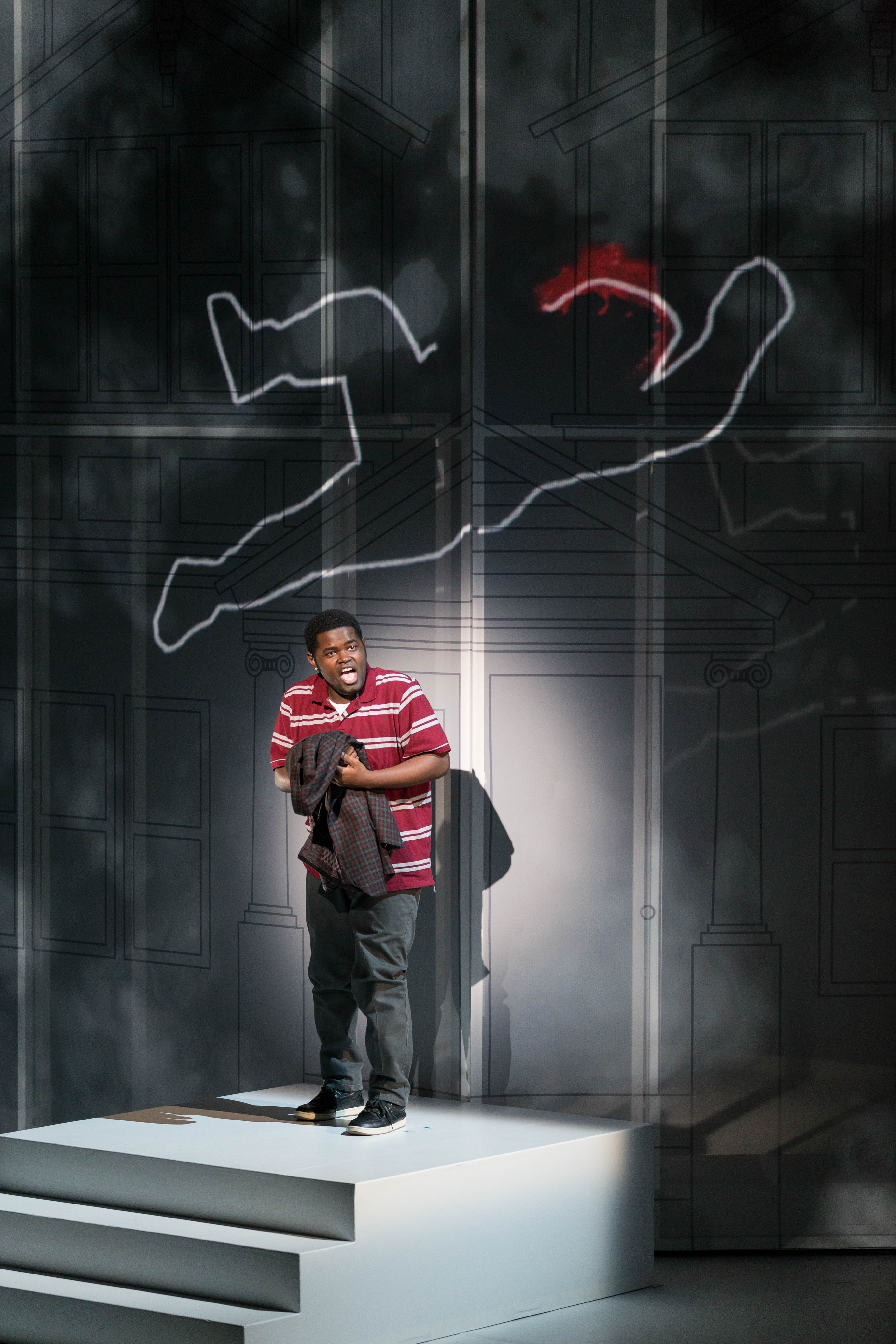The new opera We Shall Not Be Moved is set in a haunted house: The boarded-up shell of the rowhouse where, in 1985, Philadelphia police dropped a bomb on what was then the headquarters of black liberation group MOVE, killing eleven people, five of whom were children.
The neighbors on Osage Avenue, a black, middle class community, were the ones who called the police in the first place — MOVE was a menace, was the general consensus — and were told by police to evacuate and bring only a few belongings. The families expected to be back in their homes within a day or two. They did not expect a police helicopter to drop a bomb on a residential neighborhood, or that the city would choose to “let the fire burn.” The flames devoured the block, destroying 62 homes that were eventually, barely, shoddily rebuilt. As Philadelphia Magazine reported last year, “half the homes on the 6200 blocks of Osage Avenue and Pine Street are vacant; front doors are covered with slabs of plywood and padlocked.”
The teenagers of We Shall Not Be Moved don’t mean to wind up here, but their school is closed — a casualty of sweeping school closures across the city; these schools were, as a president might say, throwing the city’s budget out of whack — and their parents are who knows where, and they have no place left to go.

So the 15-year-old Un/Sung (Lauren Whitehead, spoken-word poet), a sort of Wendy among the Lost Boys, hightails it to Osage Avenue with her chosen family in tow. Among them are John Blue, a transgender boy (John Holiday, countertenor) and John Little (Daniel Shirley, tenor) the only white boy in the bunch, who lifted his last name from Malcolm X. They are fleeing violence they’ve felt and inflicted. John Blue is brutalized daily by bullies; the morning of what should be his first day of school, he fatally shoots one. “My body betrays me, pray for me, I have blood on my hands,” he sings. “Somebody pray for me like my black love matters.”
It’s at the house where they come across the ghosts — OGs, as they’re called in the show — which are presumably the spirits of the children of Move who died just before these children were born. And it’s also where they cross paths, violently, with a police officer, Glenda (Kirsten Chávez, mezzo-soprano), daughter of immigrants turned ardent believer in the force: “Ghetto flower picked and planted in the law.” The opera thrills with the urgency of people who are desperate for the lives they aren’t sure they deserve but ache for all the same.

We Shall Not Be Moved, presented by Opera Philadelphia with the Apollo Theater, premiered as part of O17, Opera Philadelphia’s first fall festival. (It arrives at New York’s Apollo Theater on Friday.) Its origins are in the words of students in the Hip-H’opera program, a collaboration between Opera Philadelphia and Art Sanctuary for Philadelphia high school students to have a forum for creative expression and growth. Student writings from 2012 were the jumping-off point for WSNBM librettist Marc Bamuthi Joseph.
Directed and choreographed by Bill T. Jones and composed by Daniel Bernard Roumain, WSNBM is a hybrid of opera and spoken word, playing as fast and loose with genre and form as its characters wish they could in their lives.
“Opera is kind of a wacky form, if you think about it,” Jones said by phone. “A person can be dying of tuberculosis and still sing for three hours. There’s an element of absurdity that is placed at the service of something quite beautiful and powerful.” By the time Jones joined the project, Joseph and Roumain were already calling the piece “a hybrid opera,” and Jones was intrigued. “We came into it with the idea that we’re already going to interrogate that tradition, that purity. We wanted to make something that was a mixture.”
The “tradition” of opera, and theater more broadly, is not exactly famous for its inclusivity: Despite some high-profile anomalies like Hamilton, Broadway’s stages are dominated by white actors. Nonwhite directors, too, are a relative rarity; the disparities plainly visible onstage plague creative and technical roles as well.
In addition to the still-run-of-the-mill lack of diversity as the theater industry at large, opera has long cast white performers as characters of color, then leaned hard into ethnic stereotypes with makeup and costumes. In 2014, famously progressive Seattle was home to a Mikado that featured an all-white cast, all in yellowface. This year, the Houston Grand Opera applied “Fu Manchu facial hair” and “slanted eyebrows” to white performers in Nixon in China. In the Los Angeles Opera’s production of Akhnaten last fall, a white actor was cast as the titular Egyptian pharaoh; opening night was met with protests. The Metropolitan Opera just decided two years ago to not use blackface in a production of Otello.
“90 percent of people onstage are people of color. That is inherently political… We can’t escape that, because already, our presence is an argument.”
Lauren Whitehead, who plays Un/Sung, had only attended one opera in her life before joining a workshop for this one; she left by intermission. “I had all the same preconceived notions about opera that everyone else does, which is that it’s for sleepy, old, white audiences on Sunday afternoons who are wearing brooches and furs, who are spending a ton of money to have a highbrow art experience, who like things to be traditional.”
But now, she’s involved in a production that couldn’t be further from that vision. Nine of the ten people on stage during WSNBM, she pointed out, are people of color. The people behind the scenes of the show — the librettist, composer, director, and conductor — are all black.
“So 90 percent of people onstage are people of color. That is inherently political,” said Whitehead. “We could’ve been doing Mozart and it would’ve been political. We can’t escape that, because already, our presence is an argument.”
The story WSNBM is telling is rooted in these particular issues — race, gender, police brutality, black activism — “is politics on top of politics,” said Whitehead. “And that we have chosen to tell it in a form where maybe some people will argue that it doesn’t belong is politics on top of politics on top of politics.”

It didn’t occur to Whitehead that a character like Un/Sung, a 15-year-old black girl who, as Joseph’s libretto describes her, is “the Tubman of this railroad,” could be the focal point of an opera until it was her reality. She seemed floored, still, when we spoke the day after a performance at the Wilma Theater, as she recalled one of Un/Sung’s final lines in the show: “As a cop, is your fear more important than my brother’s life?”
“I can’t believe they wrote that,” she said. “I can’t believe a girl onstage in 2017 gets to ask that question. Because that is the question.”
The line used to be sung, though much of Un/Sung’s lyrics, as her name indicates, are spoken. “Those lines were written so beautifully,” Whitehead said. “They were gorgeous! Waterfall lines.” But the “emotional resonance” wasn’t clicking. Finally, Jones told her to say the words instead, with one instruction: “I want you to take as much time as it takes to sing it to say it.”
“We’re making the audience have to reckon with hearing the other side of this story.”
“I remember saying it, and my heart was racing,” Whitehead said. “And I looked down, and my fist was clenched… Every time I have to perform them, I get to that point, and it’s a completely out of body thing, and I feel like I’m doing the work that the people in my community who are activists and agitators and writers and politically-minded leftist folks — that’s the question they ask all the time. Every time these stories come up. Every time a cop says, ‘I was in fear of my life,’ what they’re saying is, their fear is more important than the life that they took.”
“To have [Joseph] have written that line, in an opera, and I get to say it, at least in that way, we’re doing some justice,” she added. “We’re making the audience have to reckon with hearing the other side of this story.”
WSNBM is not a polemic — and after the first 15 minutes, the MOVE bombing is never explicitly mentioned again — but its politics are undeniable. “I think [art is] inherently political,” Jones said. “I think bodies are inherently political.”
“You can’t help but tell a story and have it be politically charged,” said John Holliday, who plays John Blue. “We’re not doing it for that… But there’s no way that you can be an artist and not talk about what’s going on.”
“How could we be 90 percent people of color on stage and not talk about school closings and teenagers’ relationships to guns and police?” Whitehead asked. “In some ways, it feels like we have to.”
